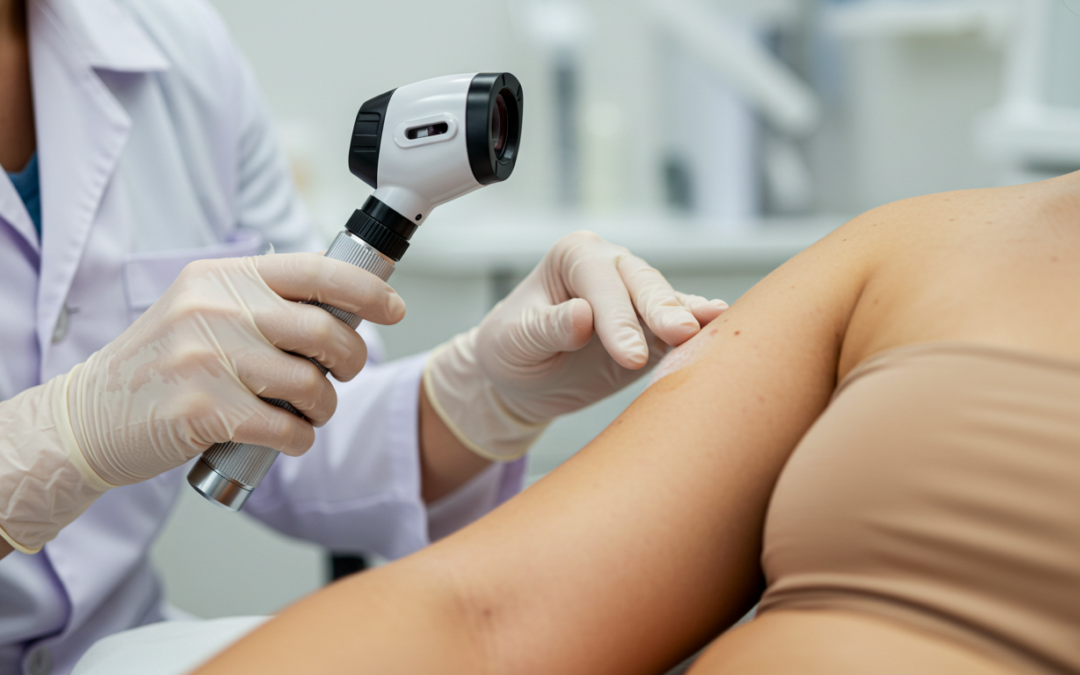When it comes to our health, we often think about regular checkups with our GP, staying active, eating well, and monitoring our mental well-being. But how often do you stop and think about your skin—your body’s largest organ? Skin cancer is one of the most common cancers in the world, and in Australia, it’s a public health concern that affects people of all ages and skin types. That’s why regular skin checks are essential. But here’s something many people don’t realise: your skin check doesn’t always have to be done by a doctor.
A qualified dermal clinician/dermoscopist is a skin expert who plays a critical role in early detection, prevention, and education when it comes to skin health.
What is a Dermal Clinician?
A dermal clinician is a university-trained allied health professional who specialises in skin health, skin integrity, and non-invasive skin therapies. These clinicians are qualified to perform comprehensive skin assessments, use dermoscopy to analyse skin lesions, monitor for changes over time, and refer patients to medical professionals when necessary.
They are not doctors, but they are highly skilled in skin assessment and spend much of their time focused exclusively on skin. That specialisation gives them a unique edge in spotting unusual changes early.
Why Choose a Dermal Clinician for Your Skin Check?
Choosing a dermal clinician for your skin check offers several distinct advantages, especially when considering skin cancer screening and proactive skin health management.
Specialist Knowledge of Skin Lesions
Dermal clinicians are trained in recognising benign vs. suspicious skin lesions using clinical tools such as dermoscopy. While they don’t diagnose cancer, they can identify lesions that require further investigation and streamline referrals to dermatologists or GPs with precision, ensuring timely action for potential melanoma or other skin cancers.
Longer Consultation Times for Thorough Examination
Unlike busy GP clinics, dermal clinicians often allow more time for thorough full-body skin checks. They can dedicate time to examining hard-to-see areas like the scalp, soles of the feet, or under nails—areas where melanomas can easily go unnoticed. This comprehensive approach is vital for early skin cancer detection.
Empowering Skin Education and Awareness
A large part of a dermal clinician’s role involves educating clients about skin types, sun protection, how to perform self-skin checks at home, and what warning signs to look for between visits. This empowers you to take ownership of your skin health and proactively manage your skin cancer risk.
Continuity of Care for Ongoing Skin Surveillance
If you already see a GP or dermatologist, a dermal clinician can complement that care by providing routine surveillance, tracking changes in moles or lesions over time, and helping you maintain a proactive skin check schedule. This is particularly beneficial for high-risk individuals requiring consistent mole mapping.
Ideal for At-Risk Individuals
If you have fair skin, a history of sunburns, a family history of skin cancer, or spend lots of time outdoors, dermal clinicians can offer tailored monitoring and advice specific to your risk profile. They can discuss sun safety tips and strategies for reducing UV damage.
Skin Checks Aren’t Just for the Elderly: A Critical Message for All Ages
Young adults and even teenagers can develop skin cancer. In fact, melanoma is one of the most common cancers in Australians under 30. A skin check with a dermal clinician is a simple, non-invasive appointment that could make a big difference—especially if skin changes are caught early. Don’t wait; understand your skin cancer symptoms and get checked.
What Happens During a Skin Check with a Dermal Clinician?
A skin check with a dermal clinician typically involves:
- A full-body skin examination using magnification and dermoscopy.
- Identification of any suspicious or changing lesions.
- Imaging and documentation of moles for future comparison (often referred to as mole mapping or total body photography).
- Personalised sun safety and skincare recommendations.
- A clear referral pathway if anything concerning is found, ensuring you get to a skin cancer doctor or dermatologist promptly.
No needles, no cutting, no stress—just professional observation and peace of mind.
In Summary: Prioritising Your Skin Health
Choosing to have your skin checked by a qualified dermal clinician is a smart, proactive step in maintaining your overall health. These highly trained professionals are focused on early detection, prevention, and patient education, and they often spot changes before you or your doctor do.
So don’t wait for a problem to arise. Make skin checks part of your regular health routine—and consider booking in with a dermal clinician who can give your skin the specialised attention it deserves.
Your Skin, Your Responsibility—Take a Closer Look.
If you’re unsure where to start, at CosmediSpa we have a dermal clinician available to answer your questions. It might just be the most important appointment you make this year for skin cancer prevention and early diagnosis.
